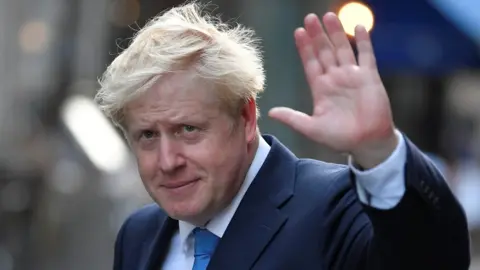Does a new UK PM mean a new Brexit plan in Brussels?
 Reuters
ReutersIn the often-divisive Brexit world of "them and us" it's easy to forget that, beyond Brexit, EU leaders still see the UK as a close partner and ally. Their messages of congratulation to Boris Johnson from across Europe on Tuesday - notably from French President Emmanuel Macron - are a timely reminder of that.
Whatever happens with Brexit, France, Germany, Poland et al still very much hope to work closely with the UK on international issues like Russia sanctions, Iran and human rights protection. On the world stage the EU considers the UK one of the good guys.
But EU leaders' welcoming tone - a diplomatic courtesy at the end of the day - should not be misconstrued when it comes to Brexit and a Boris Johnson premiership.
EU invitations to the new prime minister to work with them "constructively" do not signal a willingness to accept whatever the new prime minister might demand in terms of changes to the Brexit deal.
Optimists and pessimists
One influential EU figure put it to me that there were currently two schools of thought in the EU when it comes to Boris Johnson:
Number 1: Those who believe that, once in office, he will water down his rhetoric. These EU optimists believe that, as a chief architect of Brexit, Mr Johnson is best placed to sell a compromise deal to parliament. They also hope, after so much time longing to be prime minister, that Boris Johnson ultimately won't want to risk his fledging premiership by going for a no-deal Brexit this autumn.
School of Thought Number 2: Those who predict "Varoufakis the sequel". These EU pessimists predict "lots of pointless meetings" with Prime Minister Johnson - as they believe was the case with Greece's controversial finance minister at the height of the Greek debt crisis. They think the result will be a no-deal Brexit.
First and foremost though, the EU is waiting to see which figures will have Boris Johnson's ear once he's in Downing Street.
"Only then can we begin to understand what Boris Johnson's Brexit strategy will be," one EU diplomat commented to me. "Up till now, all we've heard are slogans."
No-deal or bad deal
Of course, the EU is already familiar with Mr Johnson's so-called nuclear strategy - letting the EU know that he is very serious about a no-deal Brexit. He knows EU leaders would far prefer a coordinated Brexit. He seems to believe that the credible threat of no deal will provoke a fundamental rethink in Brussels.
But the problem with the no-deal threat is that it goes both ways.
EU leaders also think no-deal is better than a bad deal. For them. And they believe they are far better prepared.
Boris Johnson is right. The EU has more wiggle room around the Brexit deal than it has so far wanted to signal, but also I think he overestimates EU flexibility.
Europe's leaders will not want to sign up to compromises over Brexit that ultimately will hurt them.
Amendments will only be forthcoming if EU leaders deem them workable and if they are convinced the new prime minister commands a majority in parliament to get the Brexit deal through once and for all.
And while limited changes to the backstop guarantee for the border between Ireland and Northern Ireland might be conceivable - if Dublin is willing - the Boris Johnson notion of abandoning the backstop altogether is nigh on unthinkable for Brussels.
EU leaders want to safeguard their single market from non-regulation smuggled goods. This is about more than Brexit, more than the Northern Ireland peace process. The integrity of the single market is the cornerstone of the EU's success as a trading bloc.
EU leaders will not want to be seen to be abandoning Ireland either. Smaller member states are now a force to be reckoned with in the EU - working together to counter-balance Franco-German influence as the UK prepares to leave the roost.
